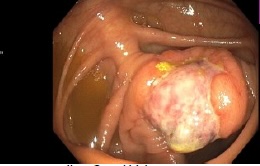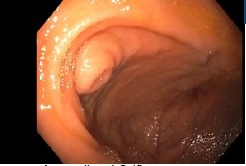Tuesday Poster Session
Category: Colon
P4640 - Ischemic Mass Due to Bowel Preparation
- AS
Andrea Schneider, DO
HonorHealth
Scottsdale, AZ
Presenting Author(s)
1HonorHealth, Scottsdale, AZ; 2Honor Health Gastroenterology - SCOTTSDALE, AZ, Scottsdale, AZ
Introduction:
Ischemic colitis occurs due to reduced blood flow to the colon. This causes insufficient levels to sustain cellular metabolic function, resulting in mucosal inflammation, ulceration and hemorrhage. The severity and extent can vary causing a wide range of symptoms from mild discomfit to acute abdominal pain and shock. This case illustrates the healing process of ischemic colitis as manifested by a colon mass that may have been caused by her bowel preparation.
Case Description/
Methods:
A 63 year old female underwent outpatient colonoscopy with sutab bowel preparation for history of colon polyps and family history of colon cancer. On the day of the colonoscopy she did not report any acute gastrointestinal symptoms. She was found to have a non-obstructing ulcerated mass at her ileocecal valve concerning for malignancy. Biopsies were obtained and a CTA abdomen and pelvis were ordered, which was performed six days later and unremarkable. Her biopsies results as ischemic colitis. Because of this atypical presentation a repeat colonoscopy was performed and showed complete healing of the ulcerated mass.
Discussion:
Ischemic colitis occurs due to reduced blood flow to the colon. This causes insufficient levels to sustain cellular metabolic function, resulting in mucosal inflammation, ulceration and hemorrhage. The severity and extent can vary causing a wide range of symptoms from mild discomfit to acute abdominal pain and shock. This case illustrates the healing process of ischemic colitis as manifested by a colon mass that may have been caused by her bowel preparation.
A 63 year old female underwent outpatient colonoscopy with sutab bowel preparation for history of colon polyps and family history of colon cancer. On the day of the colonoscopy she did not report any acute gastrointestinal symptoms. She was found to have a non-obstructing ulcerated mass at her ileocecal valve concerning for malignancy. Biopsies were obtained and a CTA abdomen and pelvis were ordered, which was performed six days later and unremarkable. Her biopsies results as ischemic colitis. Because of this atypical presentation a repeat colonoscopy was performed and showed complete healing of the ulcerated mass.
A notable finding of this patient with ischemic colitis is the endoscopic appearance resembling a colon mass and no gastrointestinal symptoms. This finding is uncommon and can easily lead to misdiagnosis.

Figure: Cecum showing an ulcerated mass

Figure: Follow up colonoscopy to evaluate prior ulcerated mass seen in the cecum that is now healed
Disclosures:
Andrea Schneider indicated no relevant financial relationships.
Gavin Levinthal indicated no relevant financial relationships.
Andrea Schneider, DO1, Gavin Levinthal, MD2. P4640 - Ischemic Mass Due to Bowel Preparation, ACG 2025 Annual Scientific Meeting Abstracts. Phoenix, AZ: American College of Gastroenterology.
